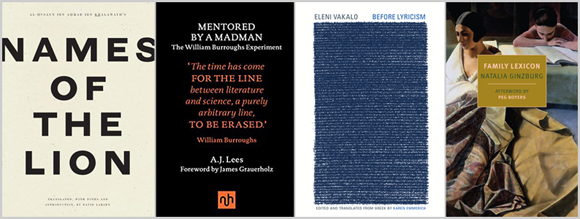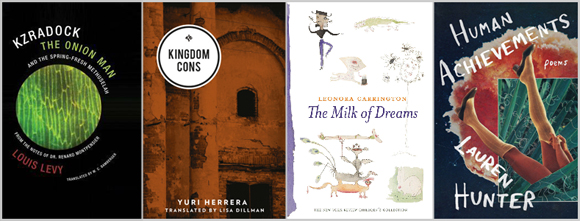The festive season is well and truly upon us, and our splendid Holiday Gift Card offer has returned! From December 1st till December 24th, for every $50 you spend, you’ll receive a $10 gift card (more info here). And if you’re looking for a little shopping inspiration, check out this handy introduction to a few of our favorite books of 2017…

Names of the Lion by Ibn Khālawayh; translated by David Larsen
Poet and scholar David Larsen’s English translation of the late 10th century Arabic lexicographer Ibn Khālawayh’s list of names of lions. Essentially a book of translation about translation, this unique work engages medieval linguistic scholarship with precision and clarity. Larsen’s lively introduction, notes, and the 400 epithets are an engrossing work of cultural studies.
Mentored by a Madman: The William Burroughs Experiment by A J Lees
In this extraordinary memoir, neuroscientist Andrew Lees explains how William Burroughs played an unlikely part in his medical career. Lees draws on Burroughs’ search for a cure for addiction to discover a ground-breaking treatment for shaking palsy, and learns how to use the deductive reasoning of Sherlock Holmes to diagnose patients. Lees follows Burroughs into the rainforest and under the influence of yagé (ayahuasca) gains insights that encourage him to pursue new lines of pharmacological research and explore new forms of science.
Before Lyricism by Eleni Vakalo; translated by Karen Emmerich
Eleni Vakalo (1921-2001) was an esteemed Greek poet and art critic. She received the State Poetry Prize in 1991, and the prestigious Academy of Athens Prize in 1997. This volume includes six book-length poems, five of which were originally published as separate books, which Vakalo herself designed. By bringing these poems together under a single cover, we see the complex web of intertextual relations that bind these works together. Before Lyricism enriches not only our knowledge of a key period in Vakalo’s career, but English-language readers’ understanding of modern Greek poetry as a whole.
Family Lexicon by Natalia Ginzburg; translated by Jenny McPhee
An Italian family, sizable, with its routines and rituals, crazes, pet phrases, and stories, doubtful, comical, indispensable, comes to life in the pages of this genre-defying work. Ginzburg’s Family Lexicon is about a family and language—and about storytelling not only as a form of survival but also as an instrument of deception and domination. The book takes the shape of a novel, yet everything is true.

Kzradock the Onion Man and the Spring-Fresh Methuselah by Louis Levy; translated by W. C. Bamberger
Originally published in Danish in 1910, Kzradock the Onion Man is a fevered pulp novel that reads like nothing else of its time: an anomaly within the tradition of the Danish novel, and one that makes for a startlingly modern read to this day. Combining elements of the serial film, detective story, and gothic horror novel, Kzradock is a surreal foray into psychoanalytic mysticism.
Kingdom Cons by Yuri Herrera; translated by Lisa Dillman
In the court of the King, everyone knows their place. But as the Artist wins hearts and egos with his ballads, uncomfortable truths emerge that shake the Kingdom to its core. Part surreal fable and part crime romance, this prize-winning novel from Yuri Herrera questions the price of keeping your integrity in a world ruled by patronage and power.
The Milk of Dreams by Leonora Carrington
The maverick surrealist Leonora Carrington was an extraordinary painter and storyteller who loved to make up stories and draw pictures for her children. She lived much of her life in Mexico, and her sons remember sitting in a big room whose walls were covered with images of wondrous creatures, towering mountains, and ferocious vegetation while she told fabulous and funny tales. That room was later whitewashed, but some of its wonders were preserved in the little notebook that Carrington called The Milk of Dreams.
Human Achievements by Lauren Hunter
In her passionate poetry debut collection, Hunter meditates on universal trials of the human experience, contending with rage, desire, and powerlessness. Alternating between verse lyrics and prose poems, she writes confessionally of everyday survival, suffocation in banality, longing for the past, and the performance of wellness. . . . Hunter reveals an immense sensitivity and inner musicality that forecasts more good things to come.
—Publishers Weekly
